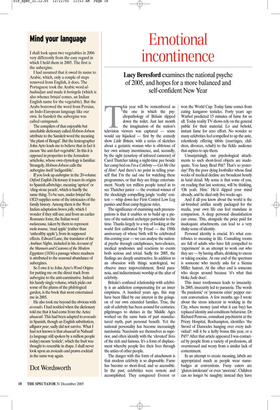Mind your language
I shall look upon two vegetables in 2006 very differently from the easy regard in which I held them in 2005. The first is the aubergine.
I had assumed that it owed its name to Arabic, which, only a couple of steps removed from English, it does. The Portuguese took the Arabic word albadindjan and made it beringela (which is also whence brinjal comes, an Indian English name for the vegetable). But the Arabs borrowed the word from Persian, an Indo-European language like our own. In Sanskrit the aubergine was called vatinganah.
The compilers of that enjoyable but unreliable dictionary called Hobson-Jobson attribute to the Sanskrit word the meaning ‘the plant of Bengal’. But the lexicographer John Ayto leads me to believe that in fact it means ‘the anti-fart vegetable’. In this it is opposed in properties to the Jerusalem artichoke, whose own etymology is familiar. Strangely, Hobson-Jobson calls the aubergine itself ‘indigestible’.
If you look up aubergine in the 20-volume Oxford English Dictionary it traces its origins to Spanish albérchigo, meaning ‘apricot’ or ‘cling-stone peach’, which is hardly the same thing. To be sure, under brinjal the OED supplies some of the intricacies of the family history. Among them is the West Indian adaptation brown jolly, which I wonder if they still use; and from an earlier Romance form, the Italian word melanzana, taken by them to represent mela insana, ‘mad apple’ (rather than ‘unhealthy apple’), from its supposed effects. Edward Lane, the translator of the Arabian Nights, included in his Account of the Manners and Customs of the Modern Egyptians (1836) a passage where madness is attributed to the seasonal abundance of aubergines.
So I owe it to John Ayto’s Word Origins for putting me on the direct track from aubergine to the anti-carminative. Indeed his handy single volume, which picks out some of the plums of the philological garden, is the book that most entertained me in 2005.
He also took me beyond the obvious with avocado. I had nodded when the dictionary told me that it had come from the Aztec ahuacatl. This had been adapted to avocado in Spanish, though an English substitution, alligator pear, sadly did not survive. What I had not known is that ahuacatl in Nahuatl (a language still spoken by a million people today) means ‘testicle’, which the fruit was thought to resemble in shape. I shall never look upon an avocado and prawn cocktail in the same way again.
Dot Wordsworth

















































 Previous page
Previous page